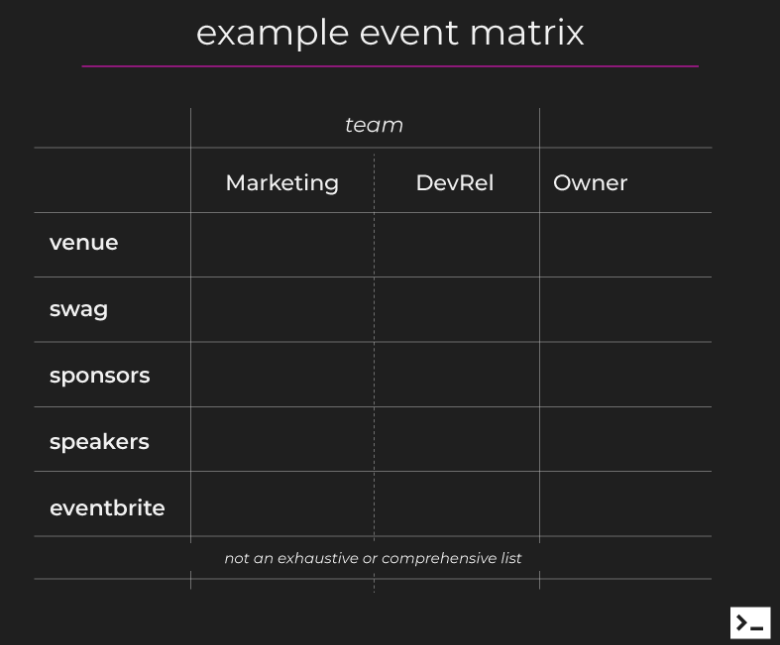Collaborating with Developer Relations Part 1: Marketing
Developers wield more influence than ever within their organizations, and developer relations is becoming an increasingly important priority for companies that sell products to a technical audience. Yet much is still being defined about the relationship between developer relations teams and more traditional ones like marketing, engineering, product, and sales.
Rigorous travel schedules and the external nature of their roles can make developer relations (DevRel) team members feel isolated from other teams, but the most effective organizations strive to create strong connections between DevRels and every other team.
Why Should We Have a Developer Relations Team?
Why? Because the investment in developer relations pays off in two ways.
The first payoff is when DevRel teams deliver on the usual developer-focused activities, like driving awareness, educating developers, creating partnerships, and gathering product feedback.
The second is when a DevRel team becomes a force-multiplying asset for other teams at the company. When marketing and DevRel collaborate on writing a newsletter, the copy most closely speaks the language of developers. When sales introduces a prospect’s CTO to a developer advocate and they have a deep conversation about the tech, the deal is easier to close. When product managers loop in DevRel to get feedback from the community, a more diverse range of opinions are represented.
To benefit from this symbiotic relationship, you need effective collaboration between DevRels and other teams. This post is the first in a 3-part series, starting with the relationship with the marketing team. These insights come from experience I gained building the developer relations team at Algolia and lessons we’ve learned at Orbit helping clients build their DevRel teams.
Developer Relations + Marketing
According to 2019 State of Developer Relations Report from Hoopy, 35% of DevRel teams report into marketing, the most of any team. In growth-focused startups, a DevRel’s top priority is usually to drive awareness and acquisition, so marketing is a natural fit. But whether DevRel reports to marketing or not, the benefits of the collaboration are the same.
Developer advocates and evangelists help the marketing team hone their messaging toward developers, separate bad content and community opportunities from good, and generally serve as an “expert witness” in questions regarding developers.
“My team is part of marketing. I find it works really well when we play to our strengths – generally we can help make better developer focused messaging and the marketers can help us promote our DevRel activities better to reach more people.” – Zan Markan (tweet)
In return, the larger marketing team creates and maintains much of the infrastructure and tooling that the DevRel team uses, like a CRM, email campaign tools, and the analytics & BI stack. Additionally, the marketing team usually has people and resources focused on specific areas like events and content, which give DevRel a valuable partner to help share the load on time-intensive activities.
Brand, Messaging, and Audience
“Developers have, out of necessity, built up an immunity to traditional marketing tactics.”
This quote from Stephen O’Grady in The New Kingmakers sums up the challenge of developer marketing, and highlights the importance of nailing a developer-focused brand; if your messaging sounds like marketing, you’ll turn off developers immediately. Tight collaboration between DevRel and marketing can help reduce risk in this area.
When DevRels are in the field working with developers, they observe real-time, up-close reactions to the company’s brand, which builds up a strong intuition over time for what does and does not resonate.
Though marketing generally owns the brand, it’s important to establish processes by which the DevRel team can share these insights and provide input on copy, design, and other brand-related initiatives. It’s also important for senior leadership to ensure that the input is taken into account.
In action: Set up a developer brand virtual team that includes the marketing brand owner, a representative from DevRel, and an executive or co-founder from outside of marketing who can break ties. Meet regularly to review brand assets and make key decisions.
DevRel Metrics and measurement
Given the data-driven nature of modern marketing, marketing teams leverage a huge array of tools to manage inbound, outbound, reporting, and more. Many developer advocates have had little exposure to these tools and often they don’t know what they should be tracking or even what’s possible.
Marketers can help DevRels become more data-driven by teaching them the basics of marketing and analytics tools, and providing access to BI tools to help them ask questions of the data. They can also help DevRels think through key metrics that are aligned to higher-level marketing and company goals, plus setup dashboards for tracking and reporting them.
In action: Set up marketing workshops as part of the onboarding for new DevRel team members. Go over analytics tools, CRM, email tools, marketing metrics and KPIs, and any other tools or information that they might need. Create a Slack channel or process for answering inevitable follow-on questions.
Customers and Relationships
Beyond metrics, marketers can help DevRels get a fuller picture of their developer community members by tapping into the company CRM. DevRels should be trained how to access and use that information for outreach and relationship management purposes.
In action: Hosting a meetup in NYC? Make sure that developer advocates know how to pull a report from the CRM or other tools and get a list of customers involved in the developer community in the Big Apple.
Marketers can take advantage of developer advocates’ large networks in order to get introductions and identify partnerships.
Content
Their forces combined, marketing and DevRel is a content dream team. Developer advocates have loads of potential to create technical material, and marketing colleagues help turn that material into high-quality content and distribute it to a wide audience.
Marketers help DevRels with content strategy, guiding overall direction while laying down the process for content distribution, and measuring to see what’s working. They help advocates think through SEO, title, and keyword optimization, as well as editing for length and readability. Additionally, marketers know how to broaden content’s distribution across partner channels or through PR relationships.
On the other hand, when marketers need to create communications, developer advocates can help them finesse voice and tone to sound more natural to developers. They can also help marketers avoid embarrassing mistakes and errors, like saying API when you mean SDK or Java when you mean JavaScript. This guidance is particularly valuable when working with junior marketing team members, or marketers who are new to developer-centric markets.
In action: Create a Slack channel (or equivalent) for reviewing content that will go in front of developers, written by anyone. Marketers provide feedback on style, grammar, tone and voice. Developer advocates provide feedback on technical accuracy and developer friendliness.
Events and Swag
Much like content, great events happen when marketing and DevRel team up. From a logistics standpoint, the marketing team is best equipped to coordinate operations and day-of activities. This enables the DevRel team to focus on the technical program and speakers, giving talks, and building relationships with the developers in the room.
In action: For every event, create a matrix that lists out all of the activities required and who the owner is, both the team—DevRel or marketing—and the individuals. This helps avoid confusion and makes sure the workload is distributed properly.

To give events a special touch, developer advocates can create experiences that developers want to interact and play with, like Cloudinary has done recently with #CloudyCam. In general, keeping the “geek factor” high will make developers feel right at home, like they would at a community-driven meetup.
Developer advocates attend tons of conferences and meetups, giving them a keen sense of what swag, stickers and gifts are currently a hit with developers. The marketing and events teams can tap into their knowledge to create giveaways that are both on-brand and on-trend.
In action: Set up a monthly meeting between developer advocates, the events team, and anyone in the company who’s gone to a developer-focused conference or meetup. Bring the swag you received and trade notes about what stood out.
Conclusion
DevRel is in a unique spot to provide missing pieces of information and points of view regarding developers to other teams. Likewise, DevRel is poised to benefit from the mature tooling and deep capabilities that other teams can offer.
The effect works in reverse too. The closer that DevRel works with other teams, the more they stay in tune with the company’s overall goals, and the more tools and techniques they learn to apply to their work.
The marketing team is often the DevRel team’s closest collaborator. Working together, they can produce content, events, and partnerships that combine marketing’s analytical mindset with DevRel’s deep understanding of the developer psyche.
For more on cross-functionally collaborating with developer relations, check out part 2 of this series on collaborating with sales, and part 3 on collaborating with product.
Subscribe to Heavybit Updates
You don’t have to build on your own. We help you stay ahead with the hottest resources, latest product updates, and top job opportunities from the community. Don’t miss out—subscribe now.
Content from the Library
Open Source Ready Ep. #26, The Economics of AI Coding with Quinn Slack
In episode 26 of Open Source Ready, Brian Douglas and John McBride sit down with Quinn Slack. They explore how Sourcegraph built...
O11ycast Ep. #84, Maddy Montaquila on .NET Aspire
In episode 84 of o11ycast, Ken Rimple and Martin Thwaites welcome Maddy Montaquila, lead PM for .NET Aspire at Microsoft. This...
Generationship Ep. #34, Together with Nathen Harvey
In episode 34 of Generationship, Nathen Harvey brings data, humor, and heart to a conversation about AI, DevOps, open source, and...
